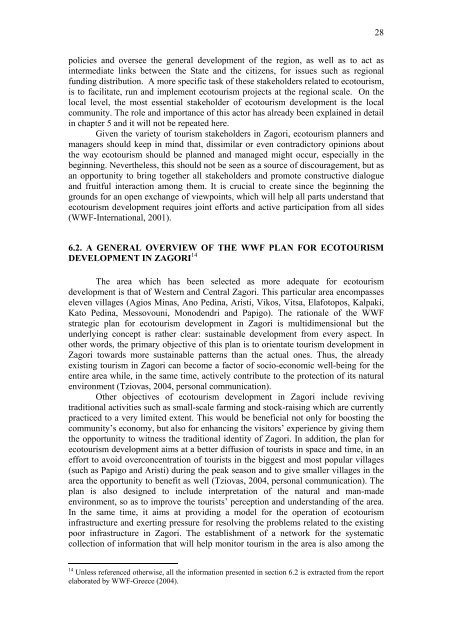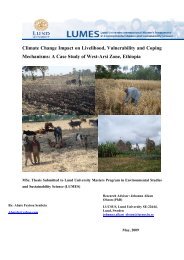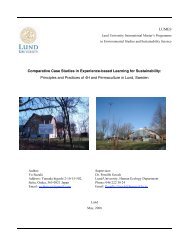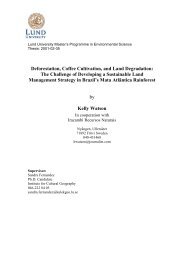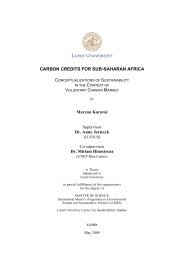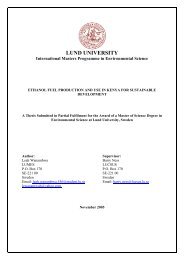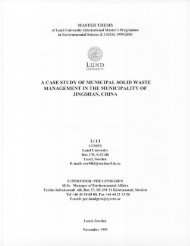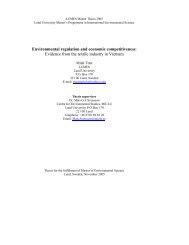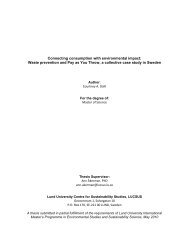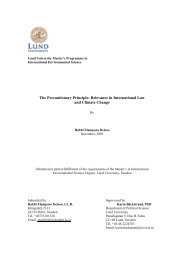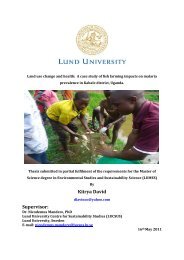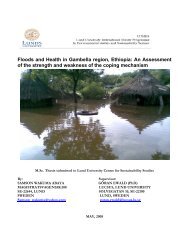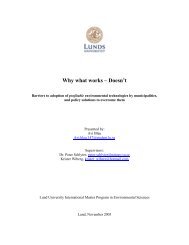Thesis title: âThe development of community-based ecotourism - lumes
Thesis title: âThe development of community-based ecotourism - lumes
Thesis title: âThe development of community-based ecotourism - lumes
Create successful ePaper yourself
Turn your PDF publications into a flip-book with our unique Google optimized e-Paper software.
28policies and oversee the general <strong>development</strong> <strong>of</strong> the region, as well as to act asintermediate links between the State and the citizens, for issues such as regionalfunding distribution. A more specific task <strong>of</strong> these stakeholders related to <strong>ecotourism</strong>,is to facilitate, run and implement <strong>ecotourism</strong> projects at the regional scale. On thelocal level, the most essential stakeholder <strong>of</strong> <strong>ecotourism</strong> <strong>development</strong> is the local<strong>community</strong>. The role and importance <strong>of</strong> this actor has already been explained in detailin chapter 5 and it will not be repeated here.Given the variety <strong>of</strong> tourism stakeholders in Zagori, <strong>ecotourism</strong> planners andmanagers should keep in mind that, dissimilar or even contradictory opinions aboutthe way <strong>ecotourism</strong> should be planned and managed might occur, especially in thebeginning. Nevertheless, this should not be seen as a source <strong>of</strong> discouragement, but asan opportunity to bring together all stakeholders and promote constructive dialogueand fruitful interaction among them. It is crucial to create since the beginning thegrounds for an open exchange <strong>of</strong> viewpoints, which will help all parts understand that<strong>ecotourism</strong> <strong>development</strong> requires joint efforts and active participation from all sides(WWF-International, 2001).6.2. A GENERAL OVERVIEW OF THE WWF PLAN FOR ECOTOURISMDEVELOPMENT IN ZAGORI 14The area which has been selected as more adequate for <strong>ecotourism</strong><strong>development</strong> is that <strong>of</strong> Western and Central Zagori. This particular area encompasseseleven villages (Agios Minas, Ano Pedina, Aristi, Vikos, Vitsa, Elafotopos, Kalpaki,Kato Pedina, Messovouni, Monodendri and Papigo). The rationale <strong>of</strong> the WWFstrategic plan for <strong>ecotourism</strong> <strong>development</strong> in Zagori is multidimensional but theunderlying concept is rather clear: sustainable <strong>development</strong> from every aspect. Inother words, the primary objective <strong>of</strong> this plan is to orientate tourism <strong>development</strong> inZagori towards more sustainable patterns than the actual ones. Thus, the alreadyexisting tourism in Zagori can become a factor <strong>of</strong> socio-economic well-being for theentire area while, in the same time, actively contribute to the protection <strong>of</strong> its naturalenvironment (Tziovas, 2004, personal communication).Other objectives <strong>of</strong> <strong>ecotourism</strong> <strong>development</strong> in Zagori include revivingtraditional activities such as small-scale farming and stock-raising which are currentlypracticed to a very limited extent. This would be beneficial not only for boosting the<strong>community</strong>’s economy, but also for enhancing the visitors’ experience by giving themthe opportunity to witness the traditional identity <strong>of</strong> Zagori. In addition, the plan for<strong>ecotourism</strong> <strong>development</strong> aims at a better diffusion <strong>of</strong> tourists in space and time, in aneffort to avoid overconcentration <strong>of</strong> tourists in the biggest and most popular villages(such as Papigo and Aristi) during the peak season and to give smaller villages in thearea the opportunity to benefit as well (Tziovas, 2004, personal communication). Theplan is also designed to include interpretation <strong>of</strong> the natural and man-madeenvironment, so as to improve the tourists’ perception and understanding <strong>of</strong> the area.In the same time, it aims at providing a model for the operation <strong>of</strong> <strong>ecotourism</strong>infrastructure and exerting pressure for resolving the problems related to the existingpoor infrastructure in Zagori. The establishment <strong>of</strong> a network for the systematiccollection <strong>of</strong> information that will help monitor tourism in the area is also among the14 Unless referenced otherwise, all the information presented in section 6.2 is extracted from the reportelaborated by WWF-Greece (2004).


